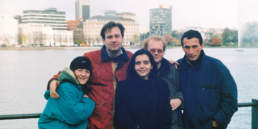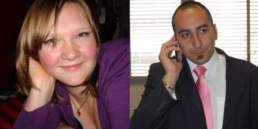 In this new series the Golden Oldies asks Les Anciens members to present their favourite event. Jeroen van Eik, former member of AEGEE-Maastricht and founder of AEGEE-Grenoble, was highly involved in developing the European School (ES) training concepts in AEGEE. Being responsible for internal education in CD in 1994/5, he managed the ES in Malcesine, one year later in July 1996 he co-organised the European School in Gliwice. This event is considered a turning point in AEGEE’s training system – no wonder that Jeroen, who works for Capgemini now, considers the ES Gliwice as his favourite event.
In this new series the Golden Oldies asks Les Anciens members to present their favourite event. Jeroen van Eik, former member of AEGEE-Maastricht and founder of AEGEE-Grenoble, was highly involved in developing the European School (ES) training concepts in AEGEE. Being responsible for internal education in CD in 1994/5, he managed the ES in Malcesine, one year later in July 1996 he co-organised the European School in Gliwice. This event is considered a turning point in AEGEE’s training system – no wonder that Jeroen, who works for Capgemini now, considers the ES Gliwice as his favourite event.
Golden Oldie: Jeroen, your favourite event is the European School in Gliwice 1996. Why?
Jeroen van Eik: What I liked most was the creative energy the participants put into the different tasks that they had to fulfil. I remember vividly that one group, which really had troubles at the start with doing boring stuff like “making a plan” and “creating a budget”, made an extremely good impression with their very colourful presentation. In the end they won the comparison between the events. It proved that enthusiasm and spirit is sometimes more important than anything else.
Golden Oldie: You were one of the coordinators of the event. How was organising it?
Jeroen van Eik: I was involved in the set up of the yearplan project Find Your Way, of which this European School was one of the three training events, and in creating the idea and setting up the general outline for the casework of this specific European School. After that, Miriam Robles managed the event together with the local organisers, and Edwin Janssen wrote and coordinated the case that was the recurring theme, the thread of the event. During the European School I gave presentations, chaired discussions and hosted a negotiation game. The last one was developed by the Clingendael Institute and was normally used to train the Dutch diplomats. To me, having the opportunity to dive into the contents of the week, have a lot contact with the participants without the worries of the daily management was really lovely.

Golden Oldie: The European School Gliwice created the fundament for today’s international education system in AEGEE. Did you guess it would become so important or influential?
Jeroen van Eik: What this week added to AEGEE was that from that moment on we had a professional internal education product, that could be taken from the shelve and be used over and over again. Before that, we reinvented the wheel over and over again. I did not think it would become so influential to be honest. I think that was also the result of several other people who kept on pushing the training concept in later years.
Golden Oldie: What were the key elements for the success of the event? The new concept with lectures and casework? The trainers? The local organisers? The participants? The location?
Jeroen van Eik: The fact that there was sufficient funding, combined with the fact that the money was wisely spend on a very good location arranged by the local organisers, very good and enthusiastic participants, good people in both coordination and in staff, and indeed a case that gave good direction for reaching the learning goals.
Golden Oldie: The year before the Gliwice the European School took place in Malcesine. That event was less advanced in terms of programme. Which conclusions did you draw from ES Malcesine – and did you manage to put everything into practice in the way you wanted?
Jeroen van Eik: The ES Malcesine was already a break from the past in the fact that it was more oriented towards teaching skills instead of theory. Before that, the ES was also very much oriented towards “how AEGEE works”, which is in general not such an interesting subject if you ask me. We integrated that part into the Agoras and PMs which was much better as we reached a much broader audience and provided the training just in time, when people really need it.
Golden Oldie: How would you describe the progress of Malcesine?
Jeroen van Eik: The good thing of Malcesine was that a group of participants immediately after the ES started with organising a series of conferences – which was quite successful as the quality of the delivered content was really high. In a way, this provided the idea of having training schools as an important part of our following projects. The ES in Malcesine was less successful in reaching Central and Eastern Europe. It was also lacking a thread, a recurring theme and we were also not able yet to entirely rule out the old fashioned lectures. By creating the week long case for the Gliwice ES, we provided a structure that put participants to work, which always provides for better a better learning experience for the participants, and we had more focus on tutoring than on lecturing – which was something new in our organisation.
Golden Oldie: What are your favourite moments of ES Gliwice?
Jeroen van Eik: I really liked the spirit of organisers, trainers and participants.
Golden Oldie: And what your worst?
Jeroen van Eik: Saying goodbye at the end of the week.
Golden Oldie: You are somehow a perfectionist. What could have been better?
 Jeroen van Eik: With the knowledge and experience we had at that moment, not that much. I think that Mirjam and Edwin did an excellent job providing their management and coordination skills. Edwin’s imaginative case description gave a lot of extra added fun. The tutors who were doing that kind of work for the first time really gave a lot of good feedback both to participants and the organisation, so we improved along the way.
Jeroen van Eik: With the knowledge and experience we had at that moment, not that much. I think that Mirjam and Edwin did an excellent job providing their management and coordination skills. Edwin’s imaginative case description gave a lot of extra added fun. The tutors who were doing that kind of work for the first time really gave a lot of good feedback both to participants and the organisation, so we improved along the way.
Golden Oldie: What was the impact of the event for AEGEE?
Jeroen van Eik: I think that the Find Your Way project added a lot of new spirit and professionalism to the AEGEE network. This European School was instrumental in it, as it showed how something can be organised in a professional way and inspire both participants and organisers and trainers – and make them more enthusiastic.
Golden Oldie: Did it also have an impact on your personal and professional life?
Jeroen van Eik: Not on my personal life, but yes, after several years of working as a consultant in several countries, I am involved in corporate training again. The work I do for Capgemini University sometimes reminds me of the AEGEE spirit.
Golden Oldie: You never organised an event again afterwards. Why?
Jeroen van Eik: When I was a member of the Comité Directeur I got involved in trying to set up Find Your Way. When we received the money, we actually had to do it. At that time, I was supposed to continue with my studies again and write my thesis. As things went differently than expected, I got involved in several of the Find Your Way events, including the European School in Gliwice. After that I simply had to finish my studies and finally become a responsible citizen. This didn’t mean that I was not involved in AEGEE anymore though. After that I have been advising several organisers of AEGEE training events from the background. It is also good if a new generation can take over and create something new. My advice can help to not throw away the good stuff and keep a fresh mind for those things that can be improved.
Golden Oldie: If you see that some participants call it their best event ever, how do
you feel?
Jeroen van Eik: Well, in those cases I feel damn proud and very sexy.



